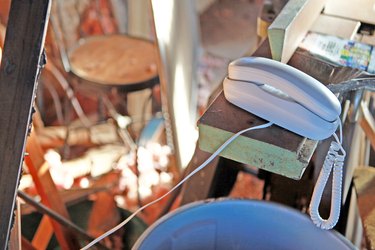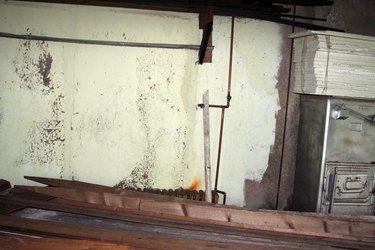Things You'll Need
Plywood or steel sheeting
Drill
Screws

A storm shelter is an area where you go to protect yourself against torrential weather conditions. Underground bunkers are strong structures for people to seek refuge during these times, often kitted out with rations. However, without such resources at your disposal, you may consider a poor man's substitute. The U.S. Department of Homeland Security provides free advice about do-it-yourself ways of protection. You can build your own cost-effective storm shelter simply by reinforcing your basement.
Step 1

Arrange an appointment with a builder to review the current condition of your basement. Check with him to make sure your basement is structurally sound before you make any adaptations.
Video of the Day
Step 2

Review the U.S. Department of Homeland Security's website for information and advice about building a storm shelter. The site provides a number of alternatives, including a wood-frame safe room and a basement lean-to safe room. These designs provide instructions for modifying existing spaces without needing to dig underground.
Step 3

Choose a solution that fits your budget and accommodation type. Review the information provided by the builder, and then consider what facilities you already have in place that can be changed to meet these needs. If you have a concrete basement, sturdy outbuilding or scrap metal sheeting could be adopted in your plan.
Step 4

Create an initial building plan. Use cheaper materials such as scrap corrugated metal or leftover wooden timbers from a builder's yard, for example, to keep your expenses at a minimum. Draw a map of your basement and add features recommended by the U.S. Federal Emergency Management Agency (FEMA), such as ventilation, fans or steel walls.
Step 5

Speak with FEMA to see if you qualify for funding. A number of funding programs are available to help communities, and this could save you money. Check to see if there is a local safe room you could use, instead of building your own or see if you could initiate a building plan for one and obtain funding that way.
Step 6

Consult a builder and obtain a quote for the building work. To ensure that the storm shelter is safe—unless you are a professional—it is recommended that you seek help, otherwise your storm shelter might not work in an emergency.
Step 7

Make final modifications on the building design, and then employ a builder to help you build the shelter. Find a family friend to help you, as he might be able to help at a discounted rate. Plus, save costs by offering your own labor so the builder doesn't have to employ another person.
Step 8

Strengthen the basement by affixing steel sheeting on the walls using steel bolts. Add a vent so that you have air circulation during a storm. Consider including a box of rations and storing them in a corner.
Video of the Day